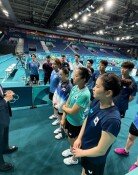Distrust drives schooling in jeopardy
Distrust drives schooling in jeopardy
Posted January. 03, 2001 19:52,
Distrust in the local public school system education is reaching previously unseen levels, a survey showed Wednesday.
According to the survey, conducted by the Korean Educational Development Institute (KEDI) on 2,829 students, teachers and parents at 33 middle and high schools across the country last June, an increasing number of people feel that a conventional education is not the only way to acquire knowledge and that the existing system doesn`t necessarily satisfy the needs of all students.
In the survey, 65.3 percent of teachers and 71.5 percent of parents said that it is the duty of students to study hard but 60.8 percent of students said "it is not necessarily so."
Asked if they think school education is a must, 31.2 percent of students said "yes" while only 12.8 percent of teachers and parents agreed. To the statement that schools are the most important place to acquire knowledge and a sense of values, 31.5 percent of students gave negative responses. By age, 27.5 percent of middle school students opposed the idea while 37.0 percent of high school students did so.
The poll also found that 48.3 percent of teachers, 28.7 percent of parents and 55.3 percent of students agreed that school education is effective in helping students discover their talents and set up career plans.
Regarding students` devotion to their studies, 66.5 percent of teachers said that about half the students in a class pay adequate attention while 65.1 percent of students said that only one third of them do so or that nobody does so. About 16.9 percent of students answered that they don`t understand their school lessons at all.
Roughly 57 percent of students opposed the idea that the school curricula contain subjects worthy of study while 59 percent said that they shouldn`t have to study certain subjects if they don`t want to.
Based on the results of the survey, the institute noted that schools lack the means to discuss and settle differences in ideas between students and schools. As ways for solving the problem, it suggested that schools remove their rigid bureaucracy, reform their uniform curricula and boost the morale of teachers.
Ha Joon-Woo hawoo@donga.com







